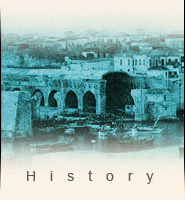
Cretan Soap
"In addition to the various natural commodities that the island produces, it also produces a number of artificial ones. Its soap is renowned, and is distributed throughout the whole of Turkey and elsewhere."
(New Geogprahy, Daniel the Monk and Grigorios the Deacon, 1791 - in Greek).
In 1717 there were only two soap factories on the entire island; a few decades later, in 1749, there were 20 such workshops in Kastro alone, with a considerable output. Although European traders did not regard Cretan soap as being of high quality, they bought large quantities to reprocess at their own factories.
A cake of soap with an inscription in Arab-script Turkish (Historical Museum of Crete, © S.C.H.S, Heraklion)
1669
1669
1669
1669
1671
1681
1688
1691
1692
1715
1735
1735
1770
1771
1780
1810
1810
1812
1821
1822
1822
1823
1824
1825
1828
1830
1831
1833
1840
1841
1850
1856
1858
1858
1862
1862
1866
1866
1868
1869
1875
1878
1878
1881
1889
1895
1895
1897
1897
1898
1898
1898










